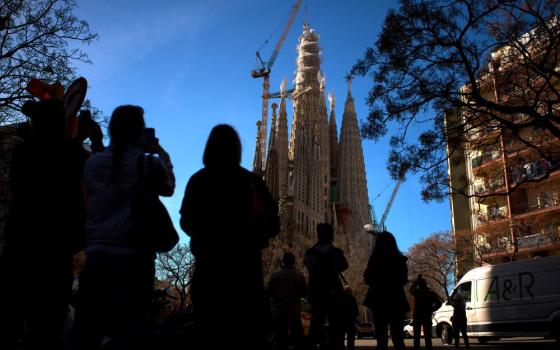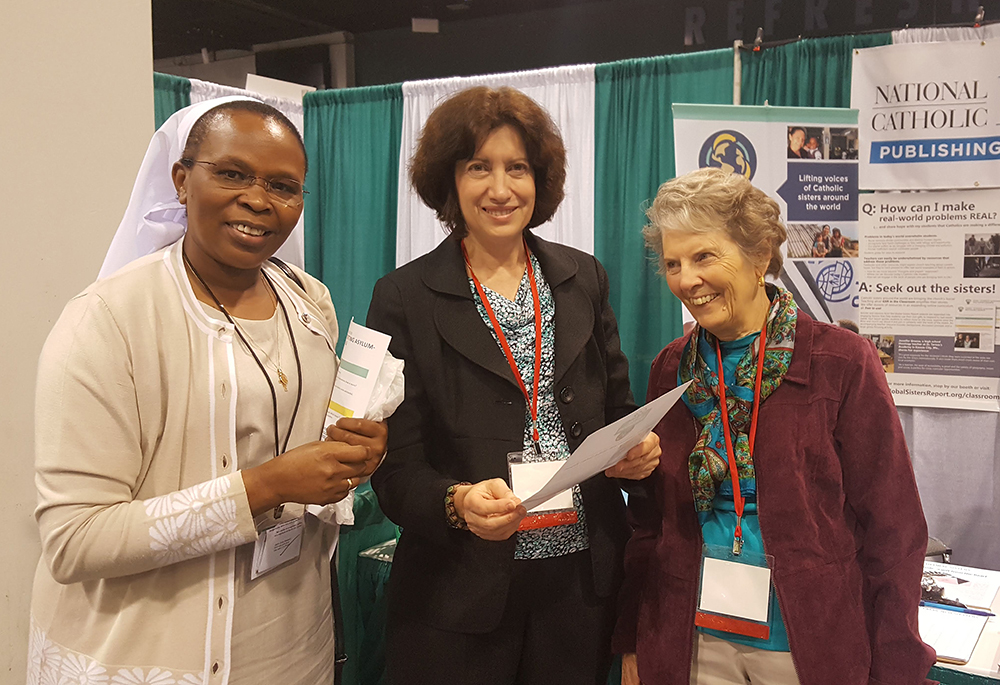
Sr. Jane Wakahiu, associate vice president of program operations and head of the Catholic Sisters Initiative at the Conrad N. Hilton Foundation, Gail DeGeorge, and Sr. Joyce Meyer, co-founder of Global Sisters Report, at the LCWR Assembly in 2023 (Courtesy of Gail DeGeorge)
After more than nine years as editor of Global Sisters Report — her final nine months as editor emerita alongside GSR editor Soli Salgado — Gail DeGeorge is retiring from journalism to pursue time with family in Florida, book writing and, she says, continuing to work with sisters in some capacity.
"I'm leaving Global Sisters Report, but I'm not leaving the sisters," she said.
Her accomplishments as editor are far-reaching: establishing GSR as the international go-to source for and about sisters; heading a small team of journalists that has won numerous reporting and editing awards; launching GSR in the Classroom and, in 2023, GSR en español.
"Boy, did I have a learning curve," said DeGeorge on covering sisters, despite being a cradle Catholic who taught catechism and was heavily involved in her parish. "But I had no idea that the world of the sisters is as complex as it is, and that the dynamics are as complicated as they are."
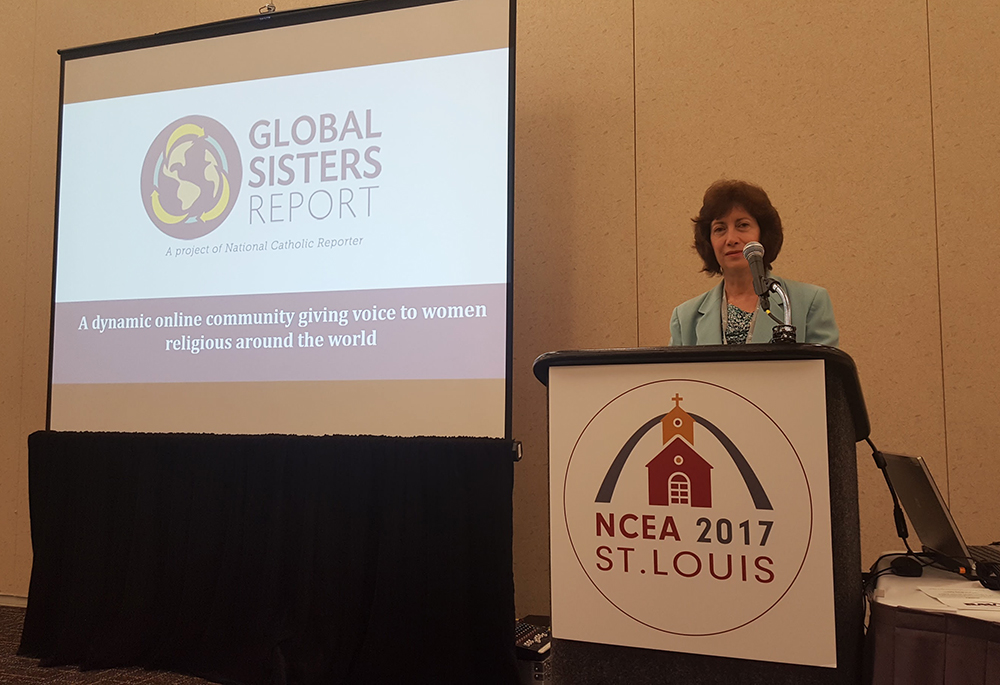
Gail DeGeorge is pictured at the National Catholic Education Association conference in April 2017 where she outlined the plans for GSR in the Classroom, a free resource available to teachers featuring the missions and ministries of sisters in different lesson themes. (Courtesy of Gail DeGeorge)
She credits others with GSR's success, including the Conrad N. Hilton Foundation (GSR's major funder); Sr. Jane Wakahiu, a member of the institute of the Little Sisters of St. Francis, Kenya, and now associate vice president for program operations and head of Catholic sisters for the foundation; National Catholic Reporter publisher/editor emeritus Tom Fox; and international liaison Sr. Joyce Meyer, one of GSR's founding figures and a sister of the Presentation of the Blessed Virgin Mary.
DeGeorge is fond of the African proverb that says, "If you want to go fast, go alone. If you want to go far, go together."
"I realized that we wanted to go far. And so while I talk fast and I think fast and I move fast, I had a lot of goals; we had deadlines to meet," said DeGeorge, whose background was in business reporting, including for BusinessWeek and Bloomberg. "I also realized that we needed to bring people along to do this together."
Reflecting on her time as editor, DeGeorge shares what mainstream media gets wrong about Catholic sisters, trends she's observed in religious life, and how her closeness to sisters has influenced her spirituality.
GSR: Even as a practicing Catholic, what surprised you most in your encounters with sisters?
DeGeorge: The sisters have an innate sense — because they're so close to the ground, they're close to the people who they serve — that they will, in their own way, quietly challenge authority when it needs to be challenged. Whether that's saving women who are being trafficked in Nigeria, or going to confront the local officials and the power brokers that allowed this to happen. That's a great credit to them. And, of course, the courage of the sisters serving in conflict areas.
From the outside, especially for those who are not Catholic, sisters can seem sort of monolithic, that they're all the same, but that is far from the case.
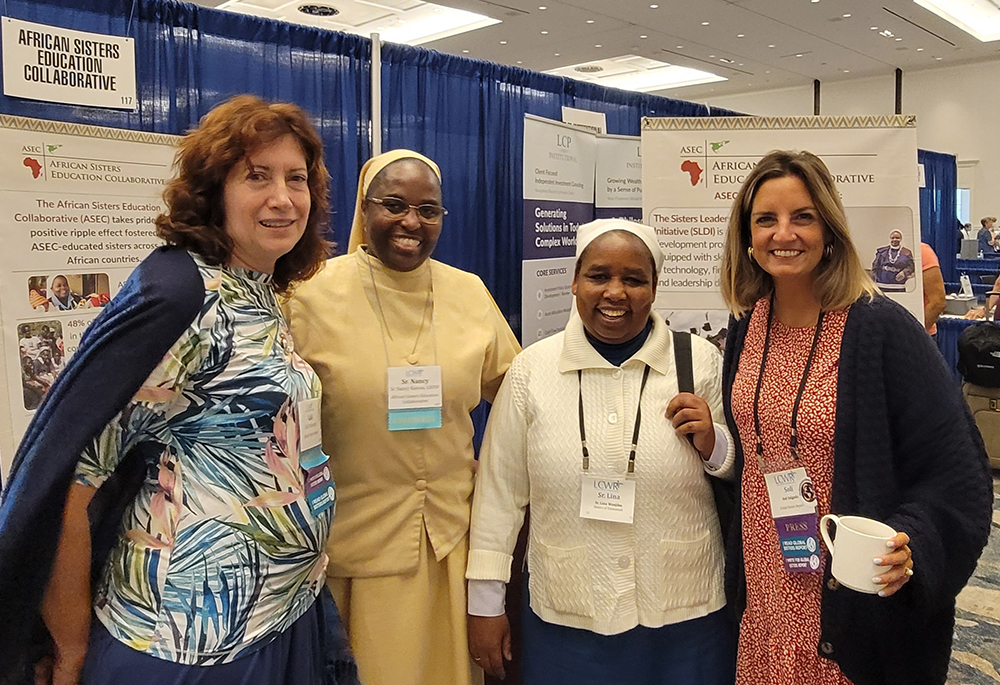
Gail DeGeorge, Sr. Nancy Kamau, a Little Sister of St. Francis of Kenya, Sr. Lina Wanjiku Ndung’u, a Sister of Emmanuel of Muranga Diocese, Kenya, and GSR editor Soli Salgado, at the LCWR Assembly in Orlando in August 2024 (Courtesy of Gail DeGeorge)
Do you think the "secular world" understands sisters? And actually for that matter, does the larger Catholic world understand sisters?
I think they're starting to, in part because of Global Sisters Report, and because of A Nun's Life Ministry, which is the podcast that GSR acquired. But there's not as much [understanding] as there needs to be. … The stereotypes that unfortunately have infected the media about sisters, that they are this monolithic group, do them a great disservice, The charisms of the communities are different, the congregations are different, their missions are different.
One very big misnomer is that people think sisters are supported by the Catholic Church. That's the biggest misunderstanding that I encounter. That somehow what we put in the collection basket on Sunday morning somehow gets to the sisters, and it doesn't. And they're very shocked that the sisters have to be self-supporting.
How could mainstream media coverage of sisters improve?
I wrote a whole column about that a couple of years ago. … To let go of your stereotypes when you're talking with sisters. To really listen, and listen to understand. To respect the work that the sisters do. To not fall into the trap of infantilizing or advertising them as "awesome." The sisters are not superwomen; that's one of the first things they'll tell you.
If you were to summarize trends in the sisters' world for the last decade, what would they be? Noting distinctions between, say, Africa and trends in the U.S.
In places like the U.S. and Europe … they're dealing with the changes in culture and society, and how they keep their ministries going, how they hand off the organizations that they've started to laywomen, and looking for ways, like through associates, to carry out their legacies.
I remember asking one young sister back in 2016 at my first [Leadership Conference of Women Religious] assembly, "Are you ever worried about the future given the numbers?" She said no. "Because if you look at our histories," she said, "our founders started history in the nation with three or four sisters, just a handful of women who were courageous enough to go out and start and spread the Gospel as Jesus instructed them to do. And so we're simply going back to where we were."
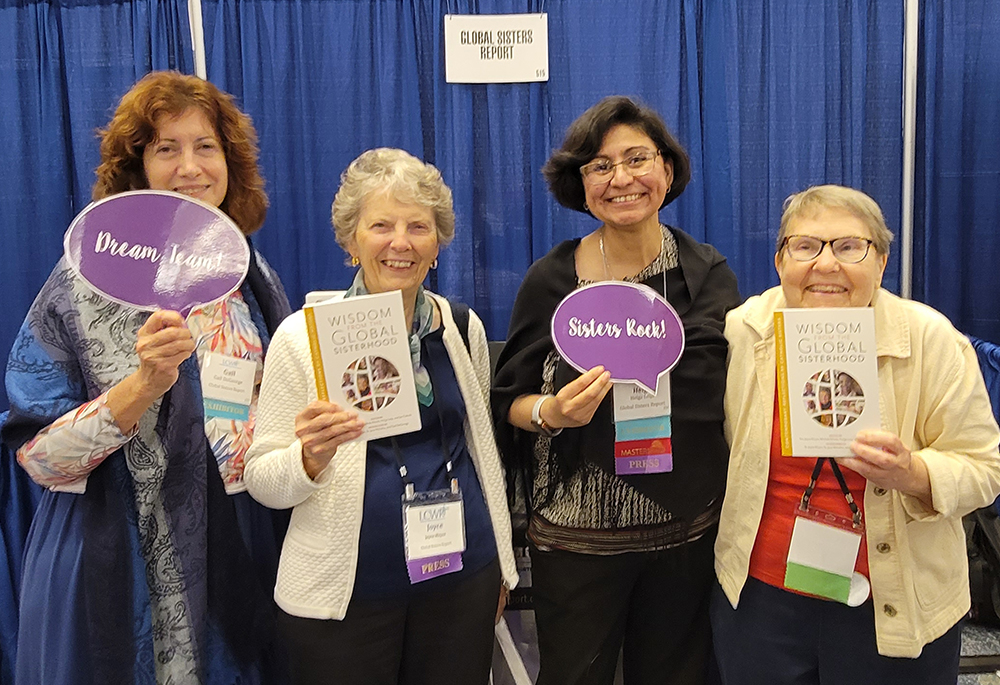
Gail DeGeorge, Sr. Joyce Meyer, co-founder of Global Sisters Report, Sr. Helga Leija, GSR columns editor and chief translator for GSR en Espanol, and Sr. Jan Cebula, former GSR sister liaison, at the LCWR Assembly in Orlando in 2024. (Courtesy of Gail DeGeorge)
Abroad, in Asia, Africa and Latin America to varying degrees, congregations are still attracting women and sisters are working to secure their futures. And I think the Hilton Foundation deserves a lot of credit under Sr. Jane [Wakahiu] for the foresight that she has had in training them in advocacy and empowerment and leadership so that they are better prepared to take on the complexity of running these congregations that sometimes have multiple locations, dozens if not hundreds of sisters, and complicated ministries in countries that are unstable or in outright conflict. And I'm glad to say that Global Sisters Report and National Catholic Reporter have been the media to report on that.
Did you, as a Catholic laywoman, feel a growing sense of solidarity with sisters?
Oh yes, definitely. But it surprises me that there is not more of a connection between women-led lay organizations and sisters' organizations. I want to see sisters included when there is a big gathering of women in the secular world, and in gatherings of Catholic women.
Advertisement
Did learning about sisters and their spirituality affect your own spirituality and relationship with the church?
Yes, most definitely. As I wrote recently in a very personal blog, I fell away from the church for many years and came back to it in my 30s. It's a very common pattern. When I came back, I studied and I was very involved. … But I think I've learned so much from the sisters when it comes to spirituality. For me, it's much more now an "all-day thing."
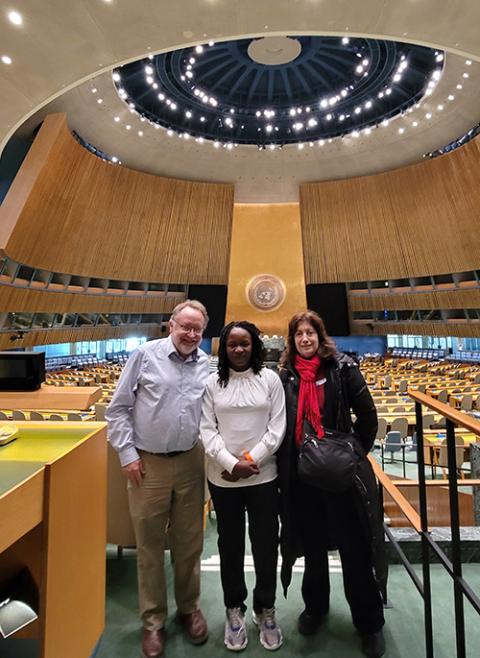
GSR international Correspondent Chris Herlinger, Africa-Mideast regional correspondent Doreen Ajiambo and Gail DeGeorge at the United Nations building in December 2022 (Courtesy of Gail DeGeorge)
The sisters exemplify the phrase, and forgive me, I don't remember the saying or whoever it is, "Pray always. Even in the worst of circumstances and the best of circumstances." I think that seeing the sisters and their faith in the most dire of circumstances has made my faith stronger. Even when I've been so upset with the Catholic Church hierarchy, with the abuse scandals, for example.
You oversaw a number of projects in the last decade. What were some of the highlights?
The series on homelessness, "A Place to Call Home," was one. The "Hope Amid Turmoil" series was absolutely the most challenging series that I've done. I've done really challenging work as a reporter. … But in terms of the smallness of our staff and our resources and the ambition that we had, in terms of sending people into war zones, and having the sisters write for us, yet protecting their identity when we needed to — all were challenges.
Looking over nearly 10 years at GSR, what is your biggest accomplishment as editor?
Getting more recognition for Catholic sisters, their ministries, their amazing lives and the people they serve. I think we've succeeded in elevating missions and ministries of sisters, but also because of feedback we got from sisters early on, we also pay a lot of attention to religious life.
Global Sisters Report has also become a community for sisters around the world. And that was deliberate and that was a goal. That we are journalists first and foremost, but we have created a space for sisters to communicate with each other and to communicate their missions and ministry to the world.
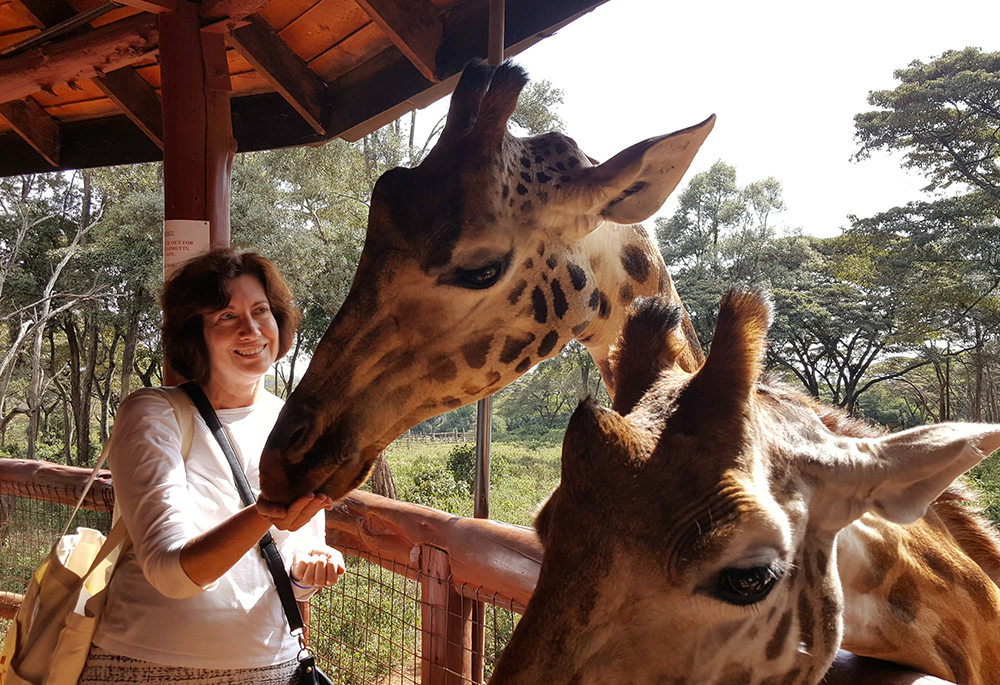
Trips abroad included some time to see local sites and scenery. Gail DeGeorge is pictured at the Giraffe Centre in Nairobi, Kenya, in October 2016 (Courtesy of Gail DeGeorge)
What are some memories you'd like to share?
Moments of complete surprise — like with being with Sr. Joyce [Meyer] at a refugee camp of Karen refugees on the border of Thailand and Myanmar. And at one point we were being encouraged to dance a dance, so I'm expecting to see a local ceremonial dance, a traditional dance. Instead, what is playing is the 'Chicken Dance,' which was played at my wedding! It's one of those hokey American songs. And so you had all these Karen refugees, and Sister Joyce, of course, jumps in and does the dance.
What surprised me is how much fun I had — that even in the difficult times and the places, that it was just in the hospitality of the sisters, the willingness to help us get the stories that we needed and get the interviews we needed.
I'm leaving Global Sisters Report, but I'm not leaving the sisters. I remember at a LCWR assembly, a sister said something like, as long as you've got spit on your tongue, [the sisters will] put you to work. And I kind of feel like that.




